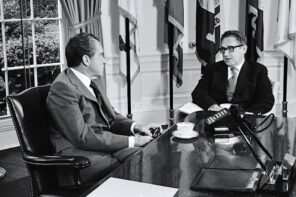In case you missed it: Religion has had quite a year. The Muslim Ban celebrated its second (or third) birthday. Reproductive justice once again took a backseat to religious “liberty,” and queer parental rights might well be next. The current/hopefully soon-to-be-former president of the United States created a Catholic supermajority on the Supreme Court. The Secretary of State addressed the Republican National Convention from Jerusalem flanked by Israeli flags. Hate crimes are at an all-time high—we’re up 7% this year alone in religious hate crimes defined broadly, and 14% percent in antisemitic hate-crimes specifically. And that’s just in the US.
Globally, religious hate crimes are also on the rise. Hindu nationalism runs rampant in India. Myanmar continues its genocide against the Rohingya. The UK’s Labour Party is trying to address its antisemitic legacy—sort of. France is at it again, and by “it” I mean state-sponsored Islamophobia. The hits just keep on coming. It has never been clearer that religious literacy—learning to think critically about religion—prepares you to better understand and navigate our swiftly tilting planet.
So naturally the University of Vermont announced its decision to eliminate its Religion Department last week.
Enrollments + service + awards = cancelled, apparently?
UVM administrators claim their decision is based in cold, hard math: Religion just doesn’t have enough majors. But the number of majors a department has does not equal how much revenue a department generates. Enrollments do that, and UVM’s award-winning faculty members consistently over-enroll their courses. Not to mention that UVM Religion grads are shaping conversations about religion at the national level—you can’t put a price on that kind of impact (no matter how much tuition costs these days).
UVM Religion also serves the University of Vermont’s professed mission to “prepare students to be accountable leaders who will bring to their work dedication to the global community, a grasp of complexity, effective problem-solving and communication skills, and an enduring commitment to learning and ethical conduct.”
As the chair of Virginia Tech’s Religion and Culture Department Matt Gabriele observes, “the study of religion is at the core of ‘studiis et rebus honestis’ [UVM’s motto].” (That’s “for virtuous studies and matters,” in case you couldn’t take classes in Classics, as UVM students soon won’t be able to.)
UVM’s Religion Department educates students—not just majors or minors, but all “students seeking careers in education, journalism, social services, business, and health fields who wish to deepen their working knowledge about religions,” through a first-of-its-kind Religious Literacy Certificate Program. And UVM Religion educates the people of Vermont, bringing high-profile religion scholars and professionals to share their research and experiences with the general public.
All told, the UVM’s tiny Religion Department contributes outsized value to the state’s flagship, land-grant university. Something about the University of Vermont’s decision to eliminate UVM Religion just doesn’t add up.
Look, we all know Humanities education has been under attack for decades. Other institutions are also cutting Religion departments, though UVM might be the first flagship public university or land-grant university to do so. And these cuts aren’t unique to religious studies, at UVM or elsewhere.
Humanities cutbacks make us dumber, crueler, and less likely to survive as a species. But these aren’t the only reasons eliminating religious studies is shortsighted and dangerous in our current and decidedly fraught political moment. In the United States, if nowhere else, religion is special.
I don’t mean special as in “I love and am personally and professionally inspired by the award-winning scholars-teachers-public servants that comprise UVM’s Religion Department”—though I do and I am. And I don’t mean special in an Ann Taves sort of way, though she’s raised some interesting questions. I mean religion is special in a constitutionally-protected, politically-entrenched, financially-incentivized, ignorance-at-your-own-and-our-nation’s-peril kind of way. Whether we recognize it or not, religion shapes the world around us.
You know what helps us recognize religion at work in the world? RELIGION CLASSES.
(Hint hint, UVM.)
Here’s the good news—pun intended though probably not particularly funny if you haven’t taken a course in New Testament. People want to know more about religion. Quite a few people, if 23.2 thousand downloads in the first year of Keeping It 101: A Killjoy’s Introduction to Religion Podcast (co-hosted by UVM Religion’s own Ilyse Morgenstein Fuerst and yours truly, and for which Morgenstein Fuerst won grant support from the New England Humanities Consortium) are any metric to go by. Speaking of podcasts, the Classical Ideas Podcast’s most listened-to episode of 2020 features Vicki Brennan, also of UVM Religion. (Brennan’s Singing Yoruba Christianity was also just shortlisted for the Delano Book Prize, by the way.)
UVM’s students want to know more about religion, too, if we can measure by the outpouring of community support for their Religion Department. And we can: signatures for the “Stop the University of Vermont from Cutting Religion Major” petition were at 3200 and counting at time of this writing. The petition’s author, UVM Religion major Katherine Brennan, writes,
“Without my religion major, I would not be pursuing a law degree to advocate for religious minorities… Departmental cuts mean the loss of kind, brilliant faculty and groundbreaking religious research. The cuts mean the religious minorities on campus have less representation and advocacy. The cuts will prevent students like me from finding their passion and from being proud of their undergraduate institution.”
Students commenting on UVM Religion’s Instagram are celebrating faculty members’ intelligence and approachability, thanking them for cultivating critical thinking skills and for the impact of their classes. UVM students are calling the decision to cut the department “gut wrenching,“ and “the worst idea UVM admins have ever had (that is REALLY saying something).”
If this year has taught us anything, it’s that people need to know more about religion. Americans certainly do. Public schools in the U.S. don’t offer religious literacy courses, which means most Americans are shockingly ignorant about religion. Even if we weren’t dumb bunnies (as my ninth grade algebra teacher Sister Gertrude would have said), the U.S. Constitution enshrines specific protections for religion that it does not afford any other subject in, say, a Humanities curriculum. The Constitution makes religion special in the United States, whether we like it or not.
There’s a lot not to like, to be honest. Our current Supreme Court seems strongly inclined to further entrench conservative white christian* supremacy for decades to come. Religion shapes public health: what kind of healthcare a hospital will provide; whether your employer has to subsidize your healthcare; whether your community should expect an uptick in COVID infections shortly after the 25th of December. Religion shapes our courts, our prisons, our economy, our law enforcement, our popular culture, even our calendars. Religion is, as we say on Keeping It 101, in the floorboards. And as former Secretary of State John Kerry put it, “we ignore the global impact of religion at our peril.”
The University of Vermont might think it’s done with Religion, but it’s wrong. Religion will continue to shape UVM and Vermont, as it continues to shape our country and our world. By proposing to eliminate UVM Religion, the University of Vermont threatens to leave its students and its community less prepared to recognize and respond to religion at work in the world.
Virtuous studies and matters, indeed.
*For a full explanation of the use of the lowercase here, see this passage in Dr. Goodwin’s Abusing Religion: Literary Persecution, Sex Scandals, and American Minority Religion (Rutgers U. Press, 2020).





